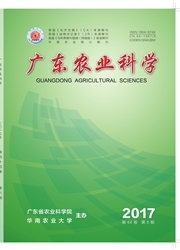

 中文摘要:
中文摘要:
该研究以3年生三七成熟种子为材料,通过对三七种子种胚切片观察、抗氧化酶活性测定及相关基因表达量的变化分析,从生理、形态及转录组3个层面了解顽拗性三七种子的内在机理。结果表明:三七种子后熟0~40 d,超氧化物歧化酶(SOD)、过氧化氢酶(CAT)、抗坏血酸过氧化物酶(APX)和谷胱甘肽还原酶(GR)的活性先升高后降低,过氧化物酶(POD)的活性升高。后熟40 d时SOD、POD、CAT、APX相关差异表达基因的FPKM值分别为28、13、356、105,皆处于较高水平,此时观察到完整的细胞结构,种胚完成形态成熟,丙二醛(MDA)含量达到了最高值,说明三七种子内部抗氧化系统抵御氧化伤害最激烈,对水分胁迫造成的氧化伤害最为敏感。伴随后熟时间的延长,膜脂过氧化作用加剧造成细胞膜的降解,导致细胞功能丧失和畸形死亡,抗氧化系统酶活性降低不能有效抵御氧化伤害可能是导致顽拗性三七种子脱水敏感的重要原因之一。
 英文摘要:
英文摘要:
The changes in ultrastructure,activity of antioxidant enzyme and expression of antioxidant enzyme were examined in 3-year-old Panax notoginseng seeds during the after-ripening process. The objective of the present study was to analyze the desiccation sensitivity in recalcitrant seeds of P. notoginseng at the physiological,ultrastructural and transcriptomic levels. The results showed that during after-ripening process of 40 d,the activity of SOD,CAT,APX and GR in seeds increased at first and then reduced,and POD activity gradually increased. At the end of after-ripening period of 40 d,FPKM values of gene related to antioxidant enzymes( SOD,POD,CAT and APX) were 28,13,356 and105,respectively,and all at a high. At the same time,intact cell structure was observed,and mature embryo was morphologically completed. However,the amount of MDA reached a peak value. Summarily,the peroxidations of membrane lipid caused cell membrane degradation and led to cell function loss and even cell death; meanwhile,antioxidant enzymes could not effectively resist the oxidative injury with the prolonged time of after-ripening,which may be the vital reasons for desiccation sensitivity in recalcitrant seeds of P. notoginseng.
 同期刊论文项目
同期刊论文项目
 同项目期刊论文
同项目期刊论文
 期刊信息
期刊信息
